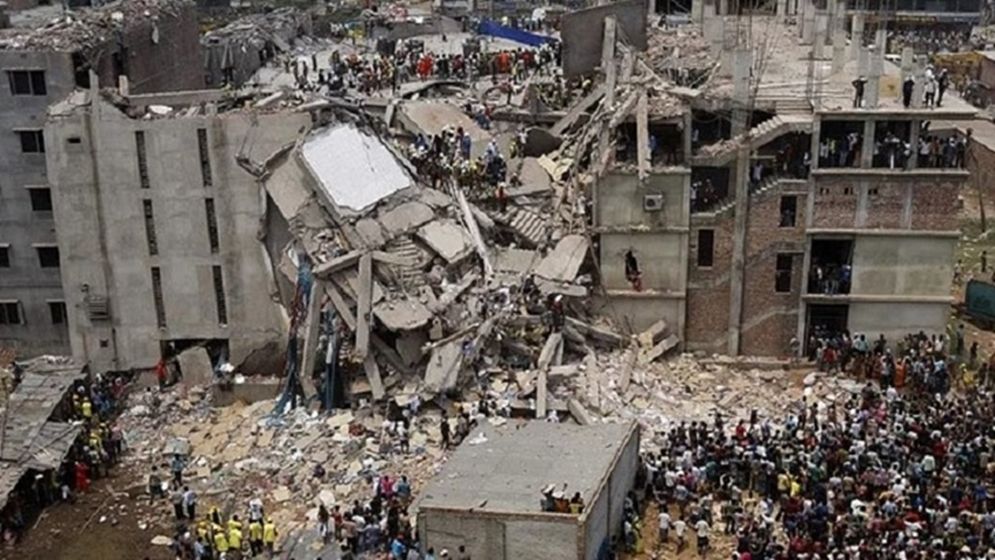12 years after the Rana Plaza collapse, survivors still await justice
More than 1,100 people, mostly female workers, died trapped in the textile garment factory. Wounds remain open due to slowed-down legal processes. But Caritas Bangladesh with its support programmes manages to be close to those who have lost their parents or have been disabled.
Dhaka (AsiaNews) - "Some days I scream in silence," says Sumi Akter in a trembling voice. "Why did I survive? Death would have been kinder than this endless disability." She was only 15 years old when, trapped for days under the rubble of Rana Plaza, Sumi was extracted alive but with a damaged spine. Since then, confined to a wheelchair, she has had to give up all acts of autonomy: 'Cradling my son, helping my husband with chores... these are all things I will never be able to do,' she says.
Her words echo the despair of hundreds of survivors and families of the victims of the Rana Plaza collapse, a disaster that today, 24 April, marks its 12th anniversary. It was in 2013 when the nine-storey building, built near the Savar bus station on the outskirts of Dhaka, suddenly collapsed, killing more than 1,134 people and injuring more than 2,500, mostly workers in the textile industry. Among them was Shahda Begum, a cleaner at New Wave Bottoms Limited and mother of young Sujon Miah, who was then just nine years old.
"My father taught me to help the poor. I owe this dream to the support of Caritas," says Sujon today. Thanks to a special programme to support children left without parents after the collapse, he was able to study and now aspires to become a lawyer. Caritas Bangladesh has provided him with a monthly stipend and a fixed deposit to support his education. But for many families, like Sumi, the burden of trauma remains indelible: 'Survival,' he says, 'came at a much heavier cost than death.
From a judicial point of view, a final verdict has not yet been reached despite the fact that two lawsuits have been filed: one for murder, the other for violations of the building construction law. Yet, neither has made significant progress. The murder trial, initiated in 2013 against 41 defendants - including the building's owner, Sohel Rana - did not see the start of testimony until January 2022. Three of the defendants have since died, and only 83 of the 594 witnesses have been heard. The last hearing, on 21 April, resulted in the partial testimony of four witnesses and a new adjournment: the next court date is scheduled for 28 April.
The second case, concerning the Building Construction Act, has been at a standstill since November 2021 due to a High Court order suspending the proceedings. Rana, who is currently in prison, cannot be released until the conclusion of both proceedings. His lawyer, Faruk Ahmed, reiterated that his client is being held without trial, while controversially claiming that the building was formally in the name of his deceased father, Abdul Khalek.
According to prosecutors, the delays are also attributable to the numerous lawsuits filed by the accused to obstruct the course of justice. State Prosecutor Bimal Samaddar acknowledged the ongoing efforts to speed up the murder trial, while Assistant State Prosecutor Ishtiaq Hossain Jipu denounced the state's previous inaction as one of the main causes of the stalemate.
"If the defendants were punished in an exemplary manner, factory owners would prioritise workers' safety," commented activist Kalpana Akhter, who has been fighting for workers' rights in the textile industry for years. "The lack of political will, especially in previous governments, has been decisive in slowing down justice," he added, urging the current administration to take stronger action.
The tragedy has exposed systemic failures within Bangladesh's garment industry, where corruption and lax regulations often prioritise profit over safety. Although the government and international brands that rely on Bangladeshi labour have implemented a number of reforms, the slowdown in legal proceedings has often caused scepticism among survivors and families of victims.
"We are trying to bring key witnesses to support the charges," said Chief Prosecutor Md. Iqbal Hossain. Some, such as Sujon and Sumi, still hope that responsibility for the collapse will be established.
07/02/2019 17:28
11/08/2017 20:05







.png)










